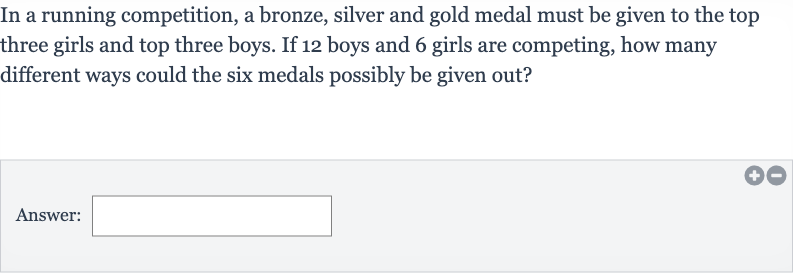Full solution
Q. In a running competition, a bronze, silver and gold medal must be given to the top three girls and top three boys. If boys and girls are competing, how many different ways could the six medals possibly be given out?Answer:
- Determine boys' medal permutations: Determine the number of ways to award medals to the boys.Since there are boys competing and medals to be awarded (gold, silver, and bronze), we need to calculate the number of permutations of boys taken at a time.The formula for permutations is where is the total number of items and is the number of items to choose.For the boys, and .
- Calculate boys' medal permutations: Calculate the number of ways to award medals to the boys. ways to award the medals to the boys.
- Determine girls' medal permutations: Determine the number of ways to award medals to the girls.Since there are girls competing and medals to be awarded (gold, silver, and bronze), we need to calculate the number of permutations of girls taken at a time.The formula for permutations is where is the total number of items and is the number of items to choose.For the girls, and .
- Calculate girls' medal permutations: Calculate the number of ways to award medals to the girls. ways to award the medals to the girls.
- Determine total medal permutations: Determine the total number of ways to award all six medals.To find the total number of ways to award all six medals, we multiply the number of ways to award the medals to the boys by the number of ways to award the medals to the girls.Total number of ways Number of ways for boys Number of ways for girlsTotal number of ways
- Calculate total medal permutations: Calculate the total number of ways to award all six medals. ways to award all six medals.
More problems from Counting principle
QuestionGet tutor help
QuestionGet tutor help
QuestionGet tutor help
QuestionGet tutor help
QuestionGet tutor help
QuestionGet tutor help
QuestionGet tutor help
QuestionGet tutor help
QuestionGet tutor help

